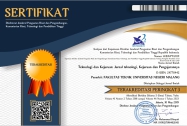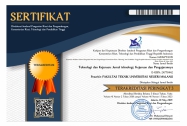Factors Affecting Students in the Kampung Bahasa Program at Public Vocational High School 1 of Boyolangu During Covid Pandemic
Abstract
Keywords
Full Text:
PDFReferences
Anggraeni F. (2015). The Effect of english club on students’ speaking ability (study at SMP N 2 lembah gumanti). Jurnal Ilmiah mahasiswa.
Arikunto, S. 2010.Prosedur penelitian suatu pendekatan praktik. Jakarta:Rineka Cipta
Arina Hidayati,I. (2014). Hubungan antara konsep diri dengan kecemasan berbahasa asing pada mahasantri pesma kh mas mansyur universitas muhammadiyah surakarta. (Doctoral dissertation, Universitas Muhammadiyah Surakarta)
Chan, W., Jaitly, N., Le, Q., & Vinyals, O. (2016). Listen, attend and spell: A neural network for large vocabulary conversational speech recognition. 2016 IEEE International Conference on Acoustics, Speech and Signal Processing (ICASSP), 4960–4964. IEEE
Creswell, J. W. (2014). Research design: qualitative, quantitative and mixed methods approaches (4th ed.). London: Sage
Derakhshan, A., Tahery, F., & Mirarab, N. (2015). Helping adult and young learners to communicate in speaking classes with confidence. Mediterranean Journal of Social Sciences, 6(2), 520.
Donal, A., & Niati, B. (2018). The implementation of english club at senior high schools in rokan hulu regency. Applied Science and Technology, 2(1).
Ekawati, R. A., & Muhroji, S. (2017). English club di sdit az-zahra sragen dalam mengembangkan keterampilan berbahasa inggris tahun ajaran 2016/2017. (Doctoral dissertation, Universitas Muhammadiyah Surakarta).
Eriany, P., Hernawati, L., & Goeritno, H. (2014). Studi deskriptif mengenai faktor-faktor yang mempengaruhi motivasi mengikuti kegiatan bimbingan belajar pada siswa smp di semarang. Psikodimensia, 13(1), 115.
Gan, Z. (2013). Understanding English speaking difficulties: an investigation of two chinese populations. Journal of Multilingual and Multicultural Development, 34(3), 231–248.
Getie, A. S. (2020). Factors affecting the attitudes of students towards learning English as a foreign language. Cogent Education, 7(1), 1738184.
Gusrayani, D. (2015). Story and song in teaching english to young indonesian efl learners: how powerful? Indonesian EFL Journal, 1(1), 63-69.
Habbash, M. (2015). Learning English vocabulary using mobile phones: Saudi Arabian EFL teachers in focus. European Scientific Journal, 11(35), 446–457.
Hamzah. (2013). Teori motivasi dan pengukurannya analisis di bidang pendidikan. Jakarta : Bumi Aksara
Horwitz, E. K., Horwitz, M. B., & Cope, J. (2010). Foreign and second language anxiety. The Modern Language Journal, 70(2), 125-132.
Kaltsum, H. U., Setyawan, H., & Krisnawan, D. A. (2016). Efektivitas mata kuliah bahasa inggris di pgsd terhadap keyakinan dan motivasi mahasiswa dalam mengajar bahasa inggris sdhonest. Profesi Pendidikan Dasar, 2(1), 12-22.
Muchemwa, S. N. (2015). Factors influencing the learning of english language for academic purposes for foreign students: A case of solusi university. European Online Journal of Natural and Social Sciences, 4(3), 527.
Newton, J. M., Ferris, D. R., Goh, C. C., Grabe, W., Stoller, F. L., & Vandergrift, L. (2018). Teaching english to second language learners in academic contexts: Reading, writing, listening, and speaking. Routledge.
Ngadimun, N., Purwanti, R., Suriansyah, A., Purwanti, M. R., & Ahmad Suriansyah, M. (2019). Empowerment of ‘English Club’to influence students achievement in speaking.
Nurmainiati, N., & Raisa, P. (2019). English dialogue dalam meningkatkan kemampuan siswa berbicara. Jurnal Ilmiah Bahasa Inggris (JIBI), 4(3).
Pattanapichet, F., & Chinokul, S. (2011). Competencies needed in oral communication in English among Thai undergraduate public relations students: A substantial gap between expectations and reality. RELC Journal, 42(2), 187-202.
Pereira, A. H., Ismail, K., & Othman, Z. (2013). A model for the malaysian english language club activities. Procedia-Social and Behavioral Sciences, 90, 48-56.
Price, P. C. (2012). Psychology research methods: Core skills and concepts v. 1.0. Chapter, 7, 164-191.
Ramli, N., Muljono, P., & Afendi, F. M. (2018). External factors, internal factors and self-directed learning readiness. Journal of Education and e-Learning Research, 5(1), 37-42.
Riswandi, S. (2009). Faktor-faktor sosial yang mendukungkeberadaan kursus bahasa inggris (Studi Pada Masyarakat Dusun Singgahan, Desa Pelem, Kecamatan Pare, Kabupaten Kediri, Jawa Timur) (Doctoral dissertation, University of Muhammadiyah Malang).
Sagala, R. (2014). Faktor yang mempengaruhi kesulitan belajar siswa. Ganesha University Pulpit Journal, 2355–1739.
Sangadji dan Sopiah. (2010). Metodologi penelitian. CV Andi Offset.
Slameto. (2003). Belajar dan faktor-faktor yang mempengaruhinya. Jakarta: PT Rineka Cipta
Soehardi.(2003). Esensi perilalu organisasional.Yogyakarta:Bagian Penerbit Fakultas Ekonomi Sarjanawiyata Tamansiswa
Sormin, U. (2018). Analisis kesulitan belajar bahasa inggris siswa. Jurnal Bahasa dan Sastra, 541–3773.
Subana, Rahadi, M.& Sudrajat.(2000). Statistik pendidikan.Bandung: Pustaka Setia
Sugiyono. (2018). Metode penelitian kuantitatif kualitatif. Yogyakarta: Alfabeta
Suryabrata, S. (2011). Psikologi pendidikan, Jakarta: PT. Raja Grafindo Persada
Suyanto, Kasihani K.E. (2008). English For young Leraners. Jakarta: Bumi Aksara
Tanveer, M. (2007). Investigation of the factors that cause language anxiety for ESL/EFL learners in learning speaking skills and the influence it casts on communication in the target language. University of Glasgow, Scotland
Tarigan. (2008). Berbicara. Bandung: Angkasa
Thornbury, Scott. (2008). How to Teach Speaking. UK: Pearson Education
Walgito, B. (2010). Pengantar Psikologi Umum.Yogyakarta: Penerbit Andi Yogyakarta.
Warnanda S, K. N. (2017). A study on english club at international language forum (ilf) as extracurricular activity in language learning at university of muhammadiyah malang.
Wibowo, A. (2015). Kampung inggris di lingkup sekolah sebagai prasarana alternatif pembelajaran bahasa inggris intensif school-based english camp as an alternative means on learning english intensively. Jurnal Ilmiah Bahasa dan Sastra, 2(1), 13-21.
Wulandari, C., Surtikanti, M. W., & Agung, A. S. S. N. (2020). A case study of Internal and external factors on the difficulties in learning english. JOEEL: Journal of English Education and Literature, 1(2), 43-48.
Yildiz, Y. (2015). The key to success in English learning can be involvement in extra curricular. International Journal of Thesis Projects and Dissertations (IJTPD), 3(3), 24-28.
Yildiz, Y. (2016). Impact of language-oriented extracurricular activities on academic achievement in Language preparation schools. Journal of Education in Black Sea Region, 1(2), 161-171.
DOI: http://dx.doi.org/10.17977/um031v45i12022p1-10
Refbacks
- There are currently no refbacks.
Copyright (c) 2023 Teknologi dan Kejuruan: Jurnal Teknologi, Kejuruan, dan Pengajarannya
Teknologi dan Kejuruan: Jurnal Teknologi, Kejuruan, dan Pengajarannya
E-ISSN 2477-0442 (online)
Contact
Faculty of Engineering, Universitas Negeri Malang (UM)
Jl. Semarang No 5 Malang 65145, Building H5, 1st Floor.
Homepage: http://journal2.um.ac.id/index.php/teknologi-kejuruan
Email: teknologikejuruan.ft@um.ac.id

This work is licensed under a Creative Commons Attribution 4.0 International License.



2.png)
1.png)
1.png)
1.png)
4.png)
1.png)
.png)

3.png)
1.png)
1.png)


